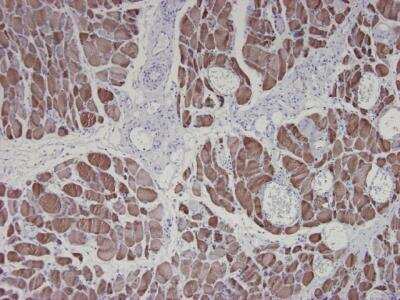Actin Antibody (3B3) - BSA Free
Novus Biologicals, part of Bio-Techne | Catalog # NBP1-97723


Conjugate
Catalog #
Key Product Details
Species Reactivity
Validated:
Human, Rat, Porcine, Goat, Rabbit
Applications
ELISA, Immunohistochemistry, Immunohistochemistry-Frozen, Immunohistochemistry-Paraffin, Western Blot
Label
Unconjugated
Antibody Source
Monoclonal Mouse IgG1 Clone # 3B3
Format
BSA Free
Concentration
1 mg/ml
Product Summary for Actin Antibody (3B3) - BSA Free
Immunogen
This antibody is a mouse monoclonal IgG1 antibody derived by fusion of NS0 Mouse myeloma cells with spleen cells from a BALB/c Mouse immunized with a peptide comprising the N-terminal nonapeptide of alpha-skeletal actin with an acetylated N-terminus (Ac-DEDETTALVC-COOH) coupled to keyhole limpet hemocyanin through the cysteine residue.
Reactivity Notes
The epitope recognized by Clone 3B3 is highly conserved and the antibody is therefore expected to react with many other species.
Specificity
This antibody highly specific for alpha-skeletal actin, and does not cross react with other actin isoforms.
Clonality
Monoclonal
Host
Mouse
Isotype
IgG1
Description
The antibody is shipped at ambient temperature and may be stored at 4C. For prolonged storage prepare appropriate aliquots and store at or below -20C. Prior to use, an aliquot is thawed slowly in the dark at ambient temperature, spun down again and used to prepare working dilutions by adding sterile phosphate buffered saline (PBS, pH 7.2). Repeated thawing and freezing should be avoided. Working dilutions should be stored at 4C, not refrozen, and preferably used the same day. If a slight precipitation occurs upon storage, this should be removed by centrifugation. It will not affect the performance or the concentration of the product.
Scientific Data Images for Actin Antibody (3B3) - BSA Free
Immunohistochemistry-Paraffin: Actin Antibody (3B3) [NBP1-97723] - Striated muscle from human tongue immunostained with 3B3 (1250).
Immunohistochemistry-Paraffin: Actin Antibody (3B3) [NBP1-97723] - Paraffin sections of human striated skeletal muscle.
Applications for Actin Antibody (3B3) - BSA Free
Application
Recommended Usage
ELISA
1:100-1:2000
Immunohistochemistry
1:10-1:500
Immunohistochemistry-Frozen
1:100-1:1000
Immunohistochemistry-Paraffin
1:100-1:1000
Western Blot
1:1000-1:5000
Application Notes
This antibody is suitable for immunohistochemistry on frozen and paraffin-embedded tissues, immunoblotting and ELISA. Optimal antibody dilutions should be determined by titration; recommended range is 1:100 - 1:1000 for immunohistochemistry with avidin-biotinylated Horseradish peroxidase complex (ABC) as detection reagent, and 1:1000 - 1:5000 for immunoblotting applications.
Please Note: Optimal dilutions of this antibody should be experimentally determined.
Formulation, Preparation, and Storage
Purification
Protein A or G purified
Formulation
PBS, pH 7.2
Format
BSA Free
Preservative
0.09% Sodium Azide
Concentration
1 mg/ml
Shipping
The product is shipped with polar packs. Upon receipt, store it immediately at the temperature recommended below.
Stability & Storage
Store at 4C short term. Aliquot and store at -20C long term. Avoid freeze-thaw cycles.
Background: Actin
Alternate Names
ACTA, actin, alpha 1, skeletal muscle, alpha skeletal muscle, alpha skeletal muscle actin, alpha-actin-1, ASMA, CFTD, CFTDM, MPFD, NEM1, NEM2, NEM3
Gene Symbol
ACTA1
Additional Actin Products
Product Documents for Actin Antibody (3B3) - BSA Free
Product Specific Notices for Actin Antibody (3B3) - BSA Free
This product is for research use only and is not approved for use in humans or in clinical diagnosis. Primary Antibodies are guaranteed for 1 year from date of receipt.
